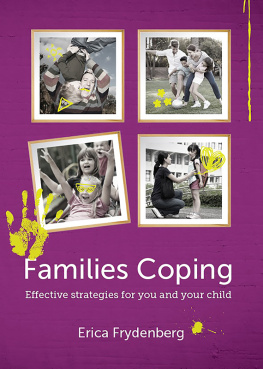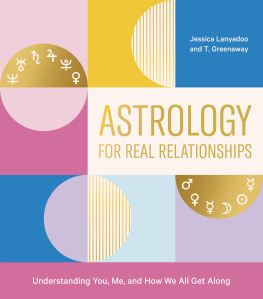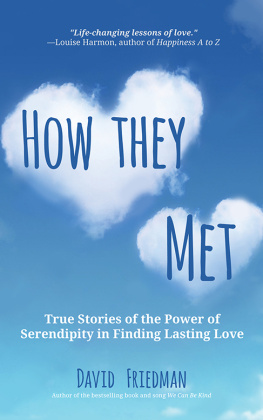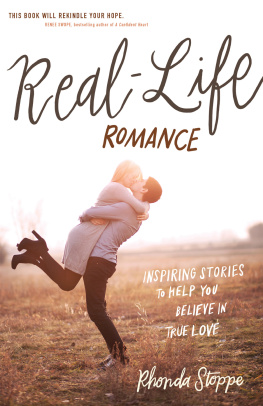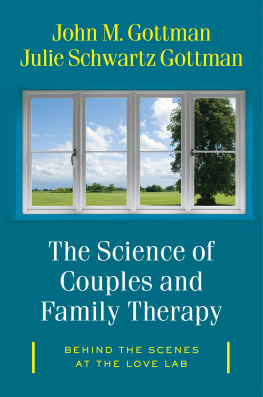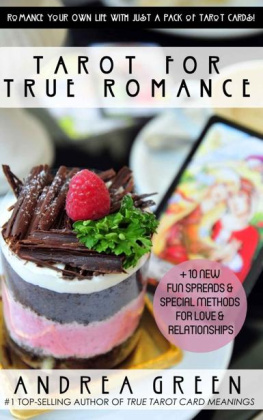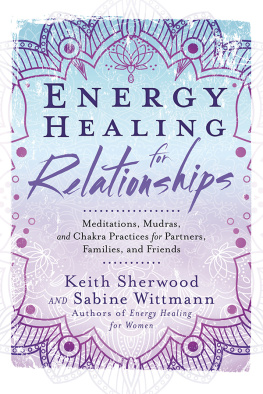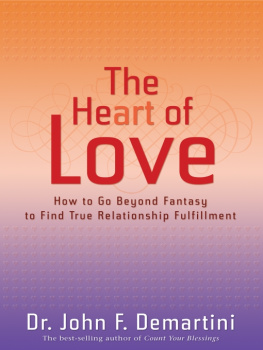The science of relationships : better romance--modern families--true friends.
Here you can read online The science of relationships : better romance--modern families--true friends. full text of the book (entire story) in english for free. Download pdf and epub, get meaning, cover and reviews about this ebook. year: 2016, genre: Home and family. Description of the work, (preface) as well as reviews are available. Best literature library LitArk.com created for fans of good reading and offers a wide selection of genres:
Romance novel
Science fiction
Adventure
Detective
Science
History
Home and family
Prose
Art
Politics
Computer
Non-fiction
Religion
Business
Children
Humor
Choose a favorite category and find really read worthwhile books. Enjoy immersion in the world of imagination, feel the emotions of the characters or learn something new for yourself, make an fascinating discovery.
- Book:The science of relationships : better romance--modern families--true friends.
- Author:
- Genre:
- Year:2016
- Rating:3 / 5
- Favourites:Add to favourites
- Your mark:
- 60
- 1
- 2
- 3
- 4
- 5
The science of relationships : better romance--modern families--true friends.: summary, description and annotation
We offer to read an annotation, description, summary or preface (depends on what the author of the book "The science of relationships : better romance--modern families--true friends." wrote himself). If you haven't found the necessary information about the book — write in the comments, we will try to find it.
Unknown: author's other books
Who wrote The science of relationships : better romance--modern families--true friends.? Find out the surname, the name of the author of the book and a list of all author's works by series.
The science of relationships : better romance--modern families--true friends. — read online for free the complete book (whole text) full work
Below is the text of the book, divided by pages. System saving the place of the last page read, allows you to conveniently read the book "The science of relationships : better romance--modern families--true friends." online for free, without having to search again every time where you left off. Put a bookmark, and you can go to the page where you finished reading at any time.
Font size:
Interval:
Bookmark:


The Science
of Relationships

Contents
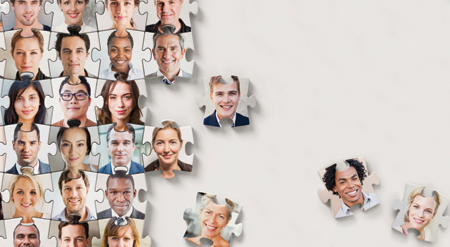
John M. Gottman, Julie Schwartz Gottman, Carrie Cole and Don Cole
Sue Johnson
Belinda Luscombe
Aziz Ansari
Mandy Oaklander
Siobhan OConnor
Photographs by Lauren Fleishman
Katy Steinmetz
Alexandra Sifferlin
Jeffrey Kluger
Susannah Felts
Virginia Sole-Smith
Belinda Luscombe
Mandy Oaklander
Alexandra Sifferlin
Bryan Walsh
Alice Park
Charlotte Alter
Parts of this edition were previously published by Time Inc.
The Power of Love
Science is revealing vital secrets about romance. Turns out, we truly need each other
By Sue Johnson

AT MY ANNUAL CHECKUP, my doctor gives me the usual lecture: eat your vegetables, get enough exercise. But then she asks me an unusual question: How is your relationship? As a couples therapist, clinical psychologist and educator, I have spent my life researching and documenting ways to understand and repair love relationships. But I never expected my doctor to ask me about my love lifeuntil I remembered that I had sent her a ream of studies on the health perks of quality relationships and the perils of their absence. Many experts now believe that much of our societys current epidemic of depression and anxiety can be traced back to our increasingly solitary lives, a theory disturbing enough to warrant an inquiry from physician to patient. Good question, I tell her with a smile.
New science is revealing how vital romantic love isas well as how it works, why it goes wrong and what we can do to make it last. These findings are incredibly timely. Sociologists agree that people are becoming lonelier and more isolated than they were in earlier generations. With the steep rise of technology, the average size of a persons real-life social network has paradoxically shrunk; people trust each other less than they used to, and fewer Americans know their neighbors. Sociologists are also finding that our life partner is often our only reliable source of support and comfort. We need these relationships more than everand, indeed, evidence suggests that its well within reach to improve our romantic bonds.
Our human need to connect with someone who will come when we call is ancient, designed to keep people plugged into the care and support of trusted others. Loves function, then, is safety and survival. Thats why the brain is wired to code emotional isolation as dangerous and secure connection with loved ones as safety. When were vulnerable children and our brains are developing, this need for emotional connection is potent and primalsomething adults acknowledge without question.
The father of attachment science, English psychologist John Bowlby, laid out these laws of love in the 1960s by studying mothers and infants and finding out that their close attachment is biological, evolutionarily important and critical to survival. This science revolutionized how we raise our children.
But that need for closeness (and the vulnerability that it requires) are often overlooked when we think about the bonds we form when we grow up. People are often ashamed to admit that they need their partner. Thats troubling, because psychologists studying adult relationships have recently found that the truths Bowlby discovered go from the cradle to the grave. This need for connection is healthy and wired into our mammalian brains; requiring others is a constructive dependency.
Even though we need them as adults just as we do when were young, these bonds are in fact unique from the ones we have as children. Adults are better at calling up mental images of loved ones when they need support, for instance, so even when they are physically absent, these loved ones are still a resource. Adult relationships, obviously, are also sexual. As bonding animals who seek irreplaceable people to rely on, most of us see serial monogamy as the most natural way to find fulfillment in love. Bonding science also suggests that passion, if we define it as the longing for connection linked to attunement and erotic play, is a renewable resource throughout the life of a relationship. Securely connected lovers report better sex and more sexual satisfaction. When you can count on being held by a zip line, you can let go and feel the thrill of the ride.
This thinking flies in the face of the self-help culture we live in, the one that teaches us to be independent and self-sufficientand thats a good thing. Consider the research of Brooke Feeney, a professor in the psychology department at Carnegie Mellon University who found that young, career-driven women who knew they could count on their partner were more confident about exploring their world and solving problems, and they were more likely to achieve their professional goals. When we have a secure base, we are stronger and more resilient, not weaker. This security allows us to move out into the world, explore and grow.
Secure bonds are especially important when things go wrong. Psychologist R. Chris Fraley of the University of Illinois showed that people traumatized by the events of 9/11 who could trust and turn to others were more resilient and better able to heal emotionally.
This is why the stakes are so high when, over and over again, two partners cant seem to find common ground. When couples mishandle their conflicts by criticizing or shutting their partner out, they experience emotional disconnectionand it literally hurts. Brain scans show that rejection by someone we depend on is processed in the same part of our brain, and in the same way, as physical pain. Both are cues for danger.
But when couples know the real problem, they can stop emotional isolation before it happens. Being able to recognize the early signs of disconnection helps partners calm down, stop triggering hurt in each other and try to resolve the conflict another way.
This can be worked out when the relationship hits the rocks, but couples can also benefit from strengthening their bond when skies are clear. In everyday conversations, securely connected lovers are accessible, responsive and engaged with each other. This reflects a healthy answer yes to the key question that defines all love relationships: Are you there for me, and can I depend on you when I am vulnerable? Secure lovers can risk reaching for each other when they feel threatened or unsure, and doing so in an open, soft way makes it easy for the other to tune in and respond. We can then help partners go to the heart of the matter and guide them into accepting and sharing the universal fears we all have: that we will be rejected, seen as unworthy, dismissed as unimportant or even abandoned. From a place of balance and trust, lovers can ask for their needs to be met. These partners often find they have more balanced emotions, a greater capacity to deal with work stress, and even the confidence to take more risks in bed and improve their sex life.
Of course, not every partnership is secure. If we have not learned to reach out and trust other people, we flip into two general styles when we feel fragile or disconnected: either anxious or avoidant. People prone to anxious attachments ramp up their emotions and push to be heard or cling to and doubt their partner. They often end up blaming or attacking the other person. Avoidant types turn away and try to numb out their longings. In conflict, they tend to decide that others will never respond, so they avoid depending on them. If these patterns become too automatic, they threaten our partner and make it much harder for him or her to respond to us.
Next pageFont size:
Interval:
Bookmark:
Similar books «The science of relationships : better romance--modern families--true friends.»
Look at similar books to The science of relationships : better romance--modern families--true friends.. We have selected literature similar in name and meaning in the hope of providing readers with more options to find new, interesting, not yet read works.
Discussion, reviews of the book The science of relationships : better romance--modern families--true friends. and just readers' own opinions. Leave your comments, write what you think about the work, its meaning or the main characters. Specify what exactly you liked and what you didn't like, and why you think so.


